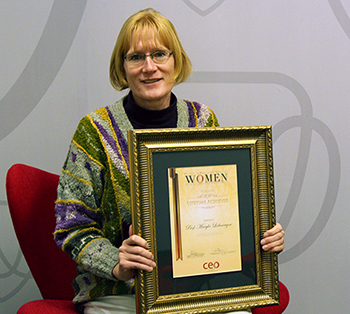Latest News Archive
Please select Category, Year, and then Month to display items
12 October 2020
|
Story Arina Engelbrecht
|
Photo Supplied
 Arina Engelbrecht from Organisational Development and Employee Well-being believes physical activity has a number of benefits for one’s health, including stress relief.
Arina Engelbrecht from Organisational Development and Employee Well-being believes physical activity has a number of benefits for one’s health, including stress relief.
Being physically active plays a big role in preventing the development of mental-health problems and in improving the quality of life of people experiencing mental-health problems.
Treatment for depression
Physical activity can be an alternative treatment for depression. It can be used as a stand-alone treatment or in combination with medication and/or psychological therapy. It promotes all kinds of changes in the brain, including neural growth, reduced inflammation, and new activity patterns are formed that promote feelings of calm and well-being. It releases endorphins – powerful chemicals in the brain that energise your spirit and make you feel good.
Physical activity can be very effective in relieving stress. Research in adults has found that physically active individuals tend to have lower stress levels compared to individuals who are less active. It also leads to improved sleep. When a person sleeps better and feels more rested, overall quality of life improves. They cope better with daily life stressors.
Reduce Alzheimer's risk
Regular physical activity can reduce your risk of developing Alzheimer's disease by up to 50%. It can also slow down further deterioration in those who have already started to develop cognitive problems. It stimulates the brain’s ability to maintain old connections as well as to make new ones.
A study asked people to rate their mood immediately after periods of physical activity (e.g. going for a walk/run, cycling, doing housework) and periods of inactivity (e.g. reading a book or watching television). Researchers found that participants felt more content, more awake, and calmer after being physically active compared to after periods of inactivity.
In conclusion, people who are physically active feel a sense of well-being, feel more energetic throughout the day, sleep better at night, have sharper memories, and feel more relaxed and positive about themselves and their lives.
“Being physically active not only changes your body, it changes your mind,
attitude, and your mood.” – Arina Engelbrecht
Researcher in Plant Breeding one of nine women on the African continent to receive acknowledgement for work in food security
2015-08-04

Prof Maryke Labuschagne |
Prof Maryke Labuschagne, Plant Breeding researcher in the Department of Plant Sciences at the University of the Free State (UFS), is one of only nine women on the African continent to receive the prestigious ‘Country Lifetime Achiever Award’ from Africa’s Most Influential Women in Business and Government Programme (MIW) this year.
During a breakfast event, CEO Communications recognised the Most Influential Women in SADC South who are Building Nations. The event took place at the Vodacom Dome in Midrand on 28 July 2015.
She received the award for her commitment and continuous contributions to food security. “I am concerned about this. We need to develop people who can go into Africa to work together for food security on the continent,” says Prof Labuschagne.
Prof Labuschagne and her students’ research focuses on the genetic improvement of food security crops in Africa, including such staples as maize and cassava. “These crops are genetically improved for yield, drought tolerance, disease, and insect resistance, as well nutritional value.”
“Food security is one of the key factors for stability and prosperity on the continent,” she says.
Apart from the fact that her research is helping to provide food for thousands of people on the continent, she is also an NRF-rated researcher, and author or co-author of over 160 articles in accredited journals.
This is not the firstaward that Prof Labuschagne has received for her work. In 2008, she was chosen as the National Agriculturalist of the Year by the Agricultural Writers Association of South Africa. In 2012, she received the Researcher of the Year award from Grain South Africa, as well as the African Union’s Kwame Nkrumah Science Award for Life Sciences on the continent.
The Country Lifetime Achiever Award is a prestigious award that recognises and honours the lifelong efforts, achievements, and contributions by individuals in their local communities. This recognition covers all sectors and countries, to create a platform where the work and involvement of extraordinary people can be displayed and noted.
About the award, Prof Labuschagne says: “It is always great to be recognised for your work.”
Elana Meyer (athlete) and Thuli Madonsela (Public Protector and advocate) have also received awards from the programme this year.